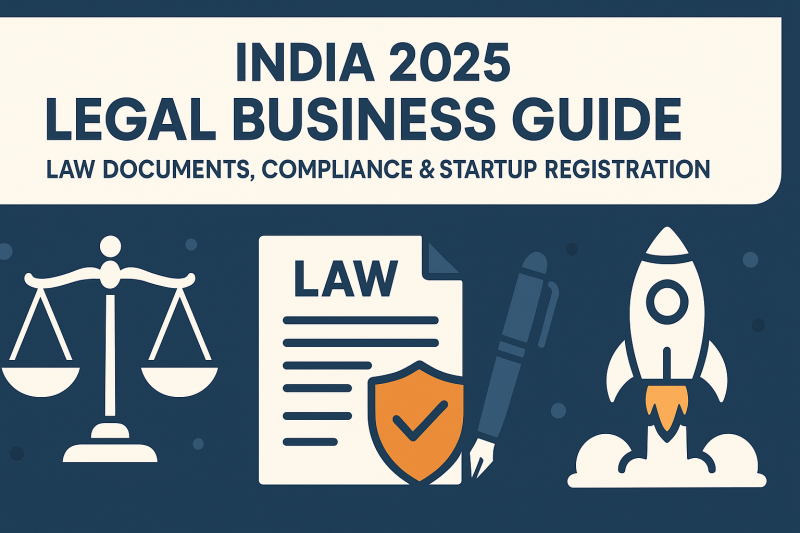Starting a business in India has become increasingly accessible thanks to government initiatives like Startup India and digitalization efforts. However, navigating the legal requirements for starting a business in India remains complex, with numerous compliance obligations that entrepreneurs must fulfill. This comprehensive guide covers all essential legal requirements, documentation, and ongoing compliance obligations to help you establish your business legally and efficiently.
Understanding Business Structures in India
Before diving into specific legal requirements, choosing the right business structure is crucial as it determines your compliance obligations, liability exposure, and operational flexibility.
Sole Proprietorship
The simplest business structure in India where the owner and business are legally the same entity. It requires minimal documentation including PAN card, Aadhaar card, and basic business licenses. While easy to establish with complete operational control, it offers no liability protection to the owner. Ideal for small-scale businesses with limited risk and local operations.
Key Requirements:
- PAN Card
- Aadhaar Card
- Bank Account
- Trade License (depending on business type)
- GST Registration (if turnover exceeds ₹20 lakh)
Advantages: Minimal compliance requirements, complete control, easy to establish
Disadvantages: Unlimited personal liability, limited growth potential
One Person Company (OPC)
A hybrid business structure introduced under the Companies Act 2013, allowing single-person ownership with limited liability protection. It requires one director, one nominee, and has caps on authorized capital (₹50 lakhs) and annual turnover (₹2 crores). OPCs must convert to private limited companies if they exceed these thresholds. Perfect for solo entrepreneurs seeking corporate benefits without partnership complications.
Mandatory Requirements:
- Minimum one director and one nominee
- Maximum authorized capital of ₹50 lakhs
- Annual turnover not exceeding ₹2 crores
- Conversion to Private Limited mandatory if thresholds are exceeded
Partnership Firm
A business structure requiring minimum two partners who share profits, losses, and unlimited liability for business debts. While registration under the Partnership Act 1932 isn’t mandatory, it provides legal protection and credibility. Partners must create a partnership deed defining roles, profit-sharing ratios, and operational guidelines. Suitable for professional services and businesses where partners contribute different skills or capital.
Essential Documents:
- Partnership Deed
- PAN cards of all partners
- Address proof of partners
- Proof of business premises
Limited Liability Partnership (LLP)
A modern business structure combining partnership flexibility with corporate limited liability protection. Governed by the LLP Act 2008, it requires minimum two partners and registration with the Ministry of Corporate Affairs. Partners’ personal assets remain protected from business liabilities, and the entity enjoys perpetual succession. Ideal for professional services, startups, and small-to-medium enterprises seeking operational flexibility with legal protection.
Key Features:
- Minimum two partners required
- Limited liability protection
- Separate legal entity status
- Perpetual succession
Private Limited Company
The most popular business structure for startups and growing companies, offering limited liability and easy fundraising capabilities. Requires minimum two shareholders (maximum 200) and two directors, with at least one resident Indian director. Provides separate legal entity status, credibility with investors, and various tax benefits for the first three years. Best suited for businesses planning to scale, raise external funding, or operate across multiple locations.
Minimum Requirements:
- Two shareholders (maximum 200)
- Two directors (maximum 15)
- Minimum authorized capital of ₹1 lakh
- One resident Indian director mandatory
Public Limited Company
Suitable for large-scale operations with plans for public fundraising.
Requirements:
- Minimum seven shareholders
- Minimum three directors
- No upper limit on shareholders
- Enhanced compliance obligations
Essential Pre-Registration Requirements
Digital Signature Certificate (DSC)
A mandatory digital identity credential required for all online government filings and MCA submissions. Class 3 DSC is specifically needed for company registration, with validity up to three years. Required for all directors and authorized signatories to digitally sign important business documents. Essential for maintaining document authenticity and security in India’s digital business ecosystem.
Types of DSC:
- Class 3 DSC: Required for company registration, MCA filings, and government submissions
- Validity: Up to 3 years
- Required for: All directors, authorized signatories, and company secretaries
Application Process:
- Submit identity and address proofs
- Complete video verification
- Pay applicable fees
- Receive DSC on USB token
Director Identification Number (DIN)
A unique identification number mandatory for every individual intending to serve as a company director. Issued by the Ministry of Corporate Affairs, it helps track director credentials and prevent fraudulent activities. Required for all MCA filings and serves as a permanent identifier throughout a director’s tenure. Essential for corporate governance and ensuring transparency in company management structures.
Application Requirements:
- Valid identity proof (PAN Card/Passport)
- Address proof
- Passport-size photograph
- DSC for digital filing
Company Name Reservation
The first critical step in business registration involving securing a unique, available company name. Done through RUN (Reserve Unique Name) application or SPICe+ Part A with 2-3 alternative name options. Names must comply with MCA guidelines, avoid prohibited words, and include appropriate business structure suffixes. Name reservation remains valid for 60 days, providing time to complete the full registration process.
Name Approval Process:
- Check name availability on MCA portal
- File RUN (Reserve Unique Name) application or use SPICe+ Part A
- Submit alternative names (typically 2-3 options)
- Receive approval within 1-3 working days
- Name reservation valid for 60 days
Naming Guidelines:
- Must be unique and not similar to existing companies
- Cannot contain prohibited words without approval
- Should end with appropriate suffix (Private Limited, LLP, etc.)
Core Legal Documents Required
Memorandum of Association (MOA)
The fundamental charter document defining a company’s constitution, objectives, and scope of activities. Contains five essential clauses: Name, Situation, Object, Capital, and Liability, establishing the company’s legal framework. Specifies the company’s authorized share capital and defines the extent of members’ liability protection. Acts as the supreme governing document that cannot be altered beyond the powers defined within it.
Essential Clauses:
- Name Clause: Official company name
- Situation Clause: Registered office address
- Object Clause: Business objectives and activities
- Capital Clause: Authorized share capital details
- Liability Clause: Members’ liability limitations
Articles of Association (AOA)
The internal rule book governing a company’s day-to-day operations, management structure, and stakeholder relationships. Defines shareholder rights, director duties, meeting procedures, voting mechanisms, and share transfer regulations. Must be consistent with the MOA and Companies Act provisions while addressing company-specific operational needs. Can be amended through special resolutions, providing flexibility to adapt to changing business requirements.
Key Components:
- Shareholder rights and responsibilities
- Director powers and duties
- Meeting procedures and voting rights
- Share transfer regulations
- Dividend distribution policies
- Auditor appointment provisions
Certificate of Incorporation
The official birth certificate issued by the Registrar of Companies confirming a company’s legal existence. Contains the Corporate Identity Number (CIN), company name, incorporation date, and registered office address. Marks the point when a company becomes a separate legal entity capable of entering contracts and conducting business. Required for opening bank accounts, obtaining licenses, and establishing credibility with stakeholders and authorities.
Certificate Contents:
- Company name and Corporate Identity Number (CIN)
- Date of incorporation
- Registered office address
- Authorized share capital information
Comprehensive Registration Process
SPICe+ Form Filing
A unified online form that streamlines multiple business registrations including company incorporation, PAN, TAN, and statutory registrations. Eliminates the need for separate applications by integrating name reservation, incorporation, and tax registrations in one process. Significantly reduces registration time from weeks to days while ensuring compliance with all statutory requirements. Represents India’s digital-first approach to business registration, making entrepreneurship more accessible and efficient.
SPICe+ Services:
- Company name reservation
- Company incorporation
- DIN allocation for directors
- PAN and TAN application
- EPFO and ESI registration (optional)
- Bank account opening facilitation
Required Attachments:
- MOA and AOA
- Identity and address proofs of directors/shareholders
- Registered office proof
- Director consent and declarations
- DSC of authorized signatory
Registration Timeline
Typical Processing Time: 10-15 working days
Fast-track Option: Available for additional fees
Common Delays: Incomplete documentation, name conflicts, address verification issues
Tax Registration Requirements
Goods and Services Tax (GST)
Mandatory tax registration for businesses with annual turnover exceeding ₹20-40 lakh depending on business type and location. Provides a unique GSTIN for conducting interstate business, claiming input tax credits, and maintaining legal compliance. Required for all businesses involved in interstate transactions regardless of turnover thresholds. Essential for business credibility, government tender participation, and seamless tax credit chain maintenance.
Registration Thresholds:
- ₹40 lakh for goods suppliers (most states)
- ₹20 lakh for service providers
- ₹20 lakh for special category states
- Mandatory for interstate transactions regardless of turnover
GST Registration Benefits:
- Input tax credit claims
- Legal business recognition
- Enhanced credibility with customers
- Compliance with government tender requirements
Professional Tax Registration
Required in certain states where businesses employ workers.
Applicable States: Maharashtra, West Bengal, Karnataka, Andhra Pradesh, Telangana, and others
Registration Timeline: Within 30 days of business commencement
Annual Compliance: Regular return filing and tax payments
Employee-Related Registrations
Provident Fund (PF) Registration:
- Mandatory for establishments with 20+ employees
- Registration with Employees’ Provident Fund Organization (EPFO)
- Monthly contribution requirements
Employees’ State Insurance (ESI):
- Applicable for establishments with 10+ employees
- Medical benefits for employees
- Monthly premium payments required
Startup India Recognition and DPIIT Benefits
DPIIT Recognition Eligibility
Government certification for startups providing access to tax benefits, regulatory exemptions, and funding opportunities. Eligible companies must be less than 10 years old with annual turnover under ₹100 crore and innovative business models. Provides three-year income tax exemption, angel tax exemption, and fast-track patent processing benefits. Essential for accessing government schemes, public procurement benefits, and international market support programs.
Eligibility Criteria:
- Incorporated as Private Limited Company, LLP, or Partnership Firm
- Less than 10 years from incorporation
- Annual turnover not exceeding ₹100 crore
- Working towards innovation or scalable business model
- Not formed by splitting existing business
Benefits of DPIIT Recognition
Tax Benefits:
- Income tax exemption for 3 consecutive years out of first 10 years
- Exemption from Angel Tax under Section 56(2)(viib)
- Capital gains tax exemption under Section 54EE
Regulatory Benefits:
- Self-certification for labor and environmental laws
- Fast-track patent processing (80% fee reduction)
- No inspection for 5 years under specified laws
Funding and Support:
- Access to government funding schemes
- Public procurement benefits
- International market access support
Application Process
- Online Application: Through Startup India portal or National Single Window System
- Document Submission: Business plan, incorporation certificate, funding details
- Review Process: DPIIT evaluation (typically 2-4 weeks)
- Certificate Issuance: Digital DPIIT recognition certificate
Intellectual Property Protection
Trademark Registration
Legal protection for business names, logos, and brand elements providing exclusive usage rights and infringement protection. Registration process involves search, application, examination, publication, and certificate issuance typically taking 12-18 months. Provides nationwide protection for 10 years with unlimited renewal options and legal recourse against unauthorized usage. Critical for brand building, business valuation, and preventing competitors from using similar marks.
Registration Benefits:
- Exclusive brand usage rights
- Legal protection against infringement
- Enhanced business credibility
- Asset value creation
Application Process:
- Trademark search for availability
- Application filing with required documents
- Examination by trademark office
- Publication in trademark journal
- Registration certificate issuance
Patent Protection
For innovative products or processes, patent protection provides competitive advantages.
Types of Patents:
- Product patents
- Process patents
- Method patents
Post-Incorporation Compliance Requirements
Immediate Post-Incorporation Tasks
Within 30 Days:
- First Board Meeting conduct
- Registered office confirmation (Form INC-22)
- First auditor appointment
- Statutory registers maintenance
Within 60 Days:
- Share certificate issuance
- Stamp duty payment on share certificates
Within 180 Days:
- Commencement of business declaration (Form INC-20A)
- Minimum subscription receipt
Annual Compliance Obligations
Board and Shareholder Meetings
Board Meetings:
- Minimum four meetings per year
- At least one meeting per quarter
- Maximum gap of 120 days between meetings
Annual General Meeting (AGM):
- First AGM within 9 months of incorporation
- Subsequent AGMs within 6 months of financial year-end
- Maximum gap of 15 months between AGMs
Statutory Filings
Ongoing legal obligations including annual return filing, financial statement submission, and statutory meeting conduct. Key deadlines include MGT-7 filing within 60 days of AGM and AOC-4 filing within 30 days of AGM. Non-compliance results in penalties, director disqualification, and potential company strike-off from MCA records. Requires systematic planning, professional assistance, and automated reminder systems for timely completion.
Annual Return (Form MGT-7):
- Filing deadline: Within 60 days of AGM
- Contains company and member details
- Late filing penalties apply
Financial Statements (Form AOC-4):
- Filing deadline: Within 30 days of AGM
- Includes audited financial statements
- Director’s report attachment mandatory
Income Tax Returns:
- Annual filing mandatory regardless of profit/loss
- Due date: October 31st for companies
- Tax audit required if turnover exceeds ₹1 crore
GST Compliance
Regular Returns:
- GSTR-1: Monthly/Quarterly sales return
- GSTR-3B: Monthly summary return
- GSTR-9: Annual return
Payment Obligations:
- Monthly tax payments
- Input tax credit reconciliation
- Reverse charge mechanism compliance
Conclusion
Following the legal requirements for starting a business in India is important for success. With the right planning, documents, and expert help, the process becomes easier.
Government support and online systems have made starting a business simpler, but you must still follow rules regularly to keep it running smoothly. Since requirements change by business type and location, getting professional advice is always a good idea.
A strong legal setup lets you focus on growing your business and contributing to India’s economy.
Also Read: How to Register a Company in India: Complete Guide











